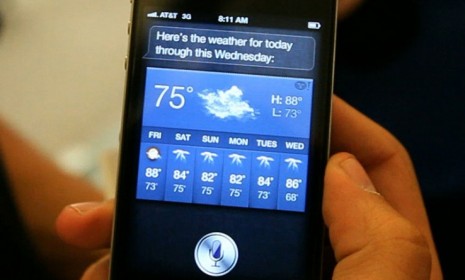Apple's new Mountain Lion OS: Where's Siri?
Sure, the newest Mac operating system is packed full of sleek new features to make it more "iPad-like." But noticeably absent is a popular, spunky voice assistant

"Clearly, Siri is Apple's most celebrated user feature," says Christina Bonnington at Wired. So why is the famed virtual assistant missing from the latest OS X update, Mountain Lion? Released last week for developers, the operating system update introduced several key features to streamline the Mac's desktop software with its mobile platforms, effectively making your computer more "iPad-like." Apple, however, has declined, so far, to include the iPhone 4S's talking assistant in other products. But if Siri is supposed to be a "game changer," what's holding Apple back? Here, 4 theories:
1. There's a microphone problem
There are several technical obstacles to getting Siri's voice-activated interface to work on a MacBook or iMac. "The iPhone is designed to be held up to your face," says Wired's Bonnington, and the 4S comes equipped with noise reduction technology in its microphone to make sure your voice registers clearly (and even then, Siri can mangle your instructions). But the built-in mic on your computer "doesn't offer the same voice-processing sensitivity" — at least not yet.
The Week
Escape your echo chamber. Get the facts behind the news, plus analysis from multiple perspectives.

Sign up for The Week's Free Newsletters
From our morning news briefing to a weekly Good News Newsletter, get the best of The Week delivered directly to your inbox.
From our morning news briefing to a weekly Good News Newsletter, get the best of The Week delivered directly to your inbox.
2. Siri would annoy your coworkers
The advantages a voice-powered assistant offers "are stronger on a small mobile device," software developer William Tunstall-Pedoe tells Wired (his company created a Siri-like clone called Evi). On a PC, you already have a much larger interface with a keyboard and mouse, so why issue commands with your mouth? Plus, "PCs are also often used in environments where the use of voice would be awkward" — like in a quiet open office, for instance.
3. A desktop Siri isn't ready for developers yet
It's a "curious thing" that Apple neglected to include Siri with Mountain Lion, especially since it's tied to a number of apps, including Notes, Reminders, and Messages, says Josh Lowensohn at CNET. One reason could be that Siri simply doesn't have a place on the desktop yet, but that's not really an excuse. The more "probable" answer is that Apple simply doesn't want to introduce voice-recognition to a desktop OS "without a way for developers to tap into it," as app developers are crucial to Apple's success.
A free daily email with the biggest news stories of the day – and the best features from TheWeek.com
4. Siri isn't as powerful as Google
Siri is great for doing short tasks like sending text messages or taking down notes. But it has more limited capabilities than robust search engines, says Bonnington. "Why would you have Siri look something up when you can more quickly run your own Google search?" But consider the possibilities of having advanced voice commands on your iMac, says Lex Friedman at Macworld. "Queries about the weather or stocks should work, and could probably surface the related dashboard widget we all know, love, and never visit." With a few tweaks, Apple could port Siri over to desktops. And based on speech-to-text dictation alone, "Siri on the Mac would be a huge accessibility win," says John Gruber at Daring Fireball. Let's hope Apple changes its thinking. And soon.
Sources: Wired, CNET, Macworld, Daring Fireball
-
 High Court action over Cape Verde tourist deaths
High Court action over Cape Verde tourist deathsThe Explainer Holidaymakers sue TUI after gastric illness outbreaks linked to six British deaths
-
 The battle over the Irish language in Northern Ireland
The battle over the Irish language in Northern IrelandUnder the Radar Popularity is soaring across Northern Ireland, but dual-language sign policies agitate division as unionists accuse nationalists of cultural erosion
-
 Villa Treville Positano: a glamorous sanctuary on the Amalfi Coast
Villa Treville Positano: a glamorous sanctuary on the Amalfi CoastThe Week Recommends Franco Zeffirelli’s former private estate is now one of Italy’s most exclusive hotels